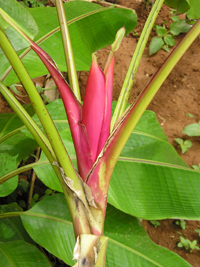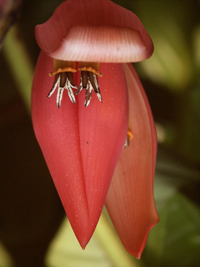Asia: 100 new species of plants in the Greater Mekong
06.10.09
The Greater Mekong spans Cambodia, China, Lao PDR, Myanmar, Thailand, and Vietnam. This vast landscape - which stretches from the Tibetan Plateau in China to the Mekong Delta in Vietnam - gave up many natural treasures in 2008 a report by WWF reveals.
The new finds found in the forest systems of the Mekong include an astonishing 27 palms, six orchids and two wild bananas. Some of the new animals included a bizarre fanged frog, which reportedly feasts on birds, and a psychedelic new leopard gecko.
Perhaps one of the most interesting botanical discoveries was the new wild banana, Musa rubinea. Boasting extraordinary red flowers it had reportedly been known in the horticultural trade for a few years. Belonging to the Rhodochlamys section of Musa genus, this group consists only of the species adapted to withstanding seasonal droughts in monsoonal areas.


Musa rubinea is a glorious new banana in the section Rhodochlamys found only in the
Nujiang watershed in the western Chinese province of Yunnan /
Markku Hakkinen, WWF Greater Mekong
According to the International Network for Improvement of Banana and Plantain (INIBAP) Rhodochlamys types are native to northeast India, Bangladesh, Myanmar and northwest Thailand and WWF believe Musa rubinea is highly endemic to the Greater Mekong.
Despite its vast size and immense biological diversity, the Greater Mekong is a confusing political and economic region that is fraught with conservation challenges to preserve the estimated five per cent of landscapes left intact.
Habitat loss, unsuitable infrastructure developments, and unsustainable and illegal natural resource use are described by WWF as the underlying threats to the delta. All of which are compounded by the ever ominous climate change, which is reportedly causing more extreme climate events and altering the natural cycles of the region, including the timings of migrations and flowering events.
Meanwhile in Thailand the climate talks in nearby Bangkok, crucial to the success of a new climate deal being agreed in Copenhagen, seem shrouded in secrecy as the rich nations of the world obstruct the press and the world from hearing what future these masters of power are busy deciding for threatened places like the Greater Mekong.
If you read this you might enjoy these too:
Himalayas: Vulnerable new species at mountainous crossroads
10/08/09
 A new report by WWF - The Eastern Himalayas: Where Worlds Collide - describes more than 350 new species living at a geographical and ecological crossroad.
A new report by WWF - The Eastern Himalayas: Where Worlds Collide - describes more than 350 new species living at a geographical and ecological crossroad.